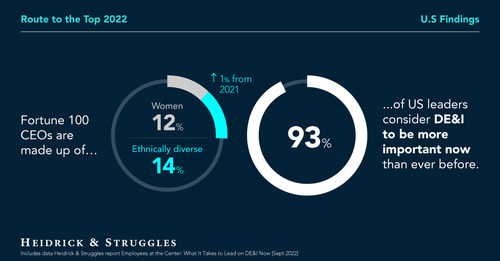The number of both women and racially and ethnically diverse CEOs among the Fortune 100 remains low at just one in four, despite an overwhelming percentage of executives that consider diversity to be more important to their organisation than it was just three years ago, according to a new survey.
The Route to the Top 2022 report from global leadership advisory Heidrick & Struggles revealed that fewer than 25% of Fortune 100 CEOs are diverse, despite the fact 93% of US leaders consider DE&I to be more important now than ever before. The report found that 12% of Fortune 100 CEOs are women and 14% are ethnically diverse; a 1% increase from 2021. As pandemic upheaval wanes, companies return to more expansive view of CEO succession; in the United States, 83% of all current sitting CEOs are first-time CEOs; up from 77% in 2021.
The annual report, now in its sixth year, found slight growth in the gender, ethnic, and racial diversity of these CEOs, to 24% in 2022, up from 22% a year ago. This is especially ironic since, according to Heidrick & Struggles’ September 2022 report, Employees at the Center: What It Takes to Lead on DE&I Now, 93% of executives surveyed viewed diversity, equity, and inclusion (DE&I) as a business initiative that has increased in importance since 2020—shedding light on a significant disconnect. The same report stated that 58% of CEOs said their companies are engaged in DE&I practices considered “leading edge” three years earlier.
DIVERSE LEADERS
The report also revealed that, among Fortune 100 CEOs, the number of women who hold the top position in 2022—12% – remains unchanged from 2021. Around 10% of those women are White and 2% are Black, whereas 14% of CEOs are ethnically diverse; up slightly from a year earlier. Among them, 6% are Asian or Asian American, 3% are Black or African American, 4% are Hispanic or Latino, and 1% are Middle Eastern.

“Substantial progress is being made in corporate DE&I efforts, but the fact remains that diversity advances among Fortune 100 CEOs is relatively unchanged,” highlighted Lyndon Taylor, Regional Managing Partner of Heidrick & Struggles’ CEO & Board of Directors Practice for the Americas and an advisor on diversity, equity, and inclusion strategies. “And while the advancements women and other diverse executives have made toward the CEO role are gaining momentum, we still aren’t seeing that momentum pivot to notable increases in CEO appointments for these underrepresented groups.”
CEO SUCCESSION
Interestingly, the stagnant level of diversity among Fortune 100 CEOs contrasts sharply with the rise of diverse board members in Fortune 500 companies: both CEOs and boards had a record share of first-time appointments, but while the CEO role stayed stagnant in terms of diversity, boards were able to capitalize and increase diversity. Heidrick & Struggles’ Board Monitor US 2022 report found record levels of seats filled by first-time directors, 43%, and women appointees, 45%, on Fortune 500 boards in 2021, while 41% were racially or ethnically diverse, on par with 2020.
“It’s clear there is much work to be done as boards outline their paths for CEO succession,” added Bonnie Gwin, Vice Chairman and Co-managing Partner of Heidrick’s global CEO & Board of Directors Practice. “Based on this data, boards would benefit by focusing on development efforts for women and diverse leaders to equip them to step into CEO roles.”
C-SUITE DIVERSITY
In another significant development, the report highlights that directors of Canadian and US companies are returning to a more expansive view of the CEO role as upheavals from the Covid-19 pandemic diminish. Thirty percent of CEOs had no previous C-suite experience prior to stepping into the chief executive role, higher than the 26% for CEOs globally. Leadership growth within their existing organisation has proven beneficial for CEO candidates, as more than three-quarters of new Canadian and US CEOs in the 2022 report were internal selections.
“As the pandemic wanes, boards and companies are looking beyond the traditional steppingstone roles of COO and CFO for their next leader,” noted Jeff Sanders, Vice Chairman and Co-managing Partner of the global CEO & Board of Directors Practice. “We are seeing a notable increase in CEOs with nontraditional backgrounds; in the United States, of CEOs 20% possess C-suite experiences beyond the big 3 roles; CEO, COO and CFO—which contrasts with only 11% in 2020.”
As for overall changes in key global CEO demographics, little change was registered from 2021. The average CEO tenure was 6.8 years, up from 6.6 years the previous year. The average age at appointment remained 49.6, the percentage of CEOs appointed before age 45 remained at 25%, and the average age of sitting CEOs remained at 56.5.
RELATED ARTICLES
Global leaders now overwhelmingly consider diversity, equity and inclusion (DE&I) a strategic business imperative as employees increasingly place value on equality advances in their work environment. Click here to read more.





































